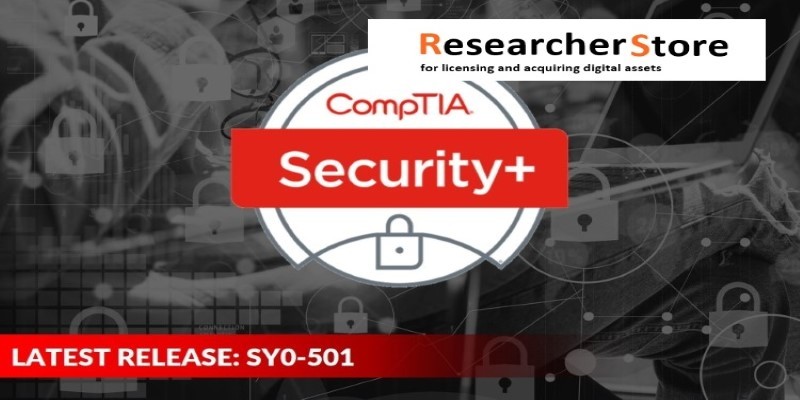
About Course
This entry-level CompTIA Security+ training will cover the objectives in the SY0-501 exam, which is the one required exam to earn the CompTIA Security+ certification.
Security+ is well-known and appreciated by government agencies and businesses, and it’s an excellent place to start for those interested in security. IT practitioners who complete this SY0-501 course will be prepared to progress into positions that contribute to junior security roles.
This course can be used for Security+ test planning, onboarding new security personnel, or even curated to be used as end-user security training for someone who leads an IT team.
Course Content
CompTIA-Security-SY0-501
-
How to Pass your SY0-501 Security+ Exam
07:34 -
An Overview of Malware
00:00 -
Viruses and Worms
00:00 -
Ransomware and Crypto-Malware
00:00 -
Trojans and RATs
00:00 -
Rootkits
00:00 -
Keyloggers
00:00 -
Adware and Spyware
00:00 -
Bots and Botnets
00:00 -
Logic Bombs
00:00 -
Phishing
00:00 -
Tailgating and Impersonation
00:00 -
Dumpster Diving
00:00 -
Shoulder Surfing
00:00 -
Hoaxes
00:00 -
Watering Hole Attacks
00:00 -
Principles of Social Engineering
00:00 -
Denial of Service
00:00 -
Man-in-the-Middle
00:00 -
Buffer Overflows
00:00 -
Data Injection
00:00 -
Cross-site Scripting
00:00 -
Cross-site Request Forgery
00:00 -
Privilege Escalation
00:00 -
DNS Poisoning and Domain Hijacking
00:00 -
Driver Manipulation
00:00 -
Zero-Day Attacks
00:00 -
Replay Attacks
00:00 -
Client Hijacking Attacks
00:00 -
Spoofing
00:00 -
Wireless Replay Attacks
00:00 -
Rogue Access Points and Evil Twins
00:00 -
Wireless Jamming
00:00 -
WPS Attacks
00:00 -
Bluejacking and Bluesnarfing
00:00 -
RFID and NFC Attacks
00:00 -
Wireless Disassociation Attacks
00:00 -
Cryptographic Attacks
00:00 -
Threat Actors
00:00 -
Penetration Testing
00:00 -
Vulnerability Scanning
00:00 -
Vulnerability Types
00:00 -
Firewalls
00:00 -
VPN Concentrators
00:00 -
Network Intrusion Detection and Prevention
00:00 -
Router and Switch Security
00:00 -
Proxies
00:00 -
Load Balancers
00:00 -
Access Points
00:00 -
SIEM
00:00 -
Data Loss Prevention
00:00 -
Network Access Control
00:00 -
Mail Gateways
00:00 -
Other Security Devices
00:00 -
Software Security Tools
00:00 -
Command Line Security Tools
00:00 -
Common Security Issues
00:00 -
Analyzing Security Output
00:00 -
Mobile Device Connection Methods
00:00 -
Mobile Device Management
00:00 -
Mobile Device Enforcement
00:00 -
Mobile Device Deployment Models
00:00 -
Secure Protocols
00:00 -
Secure Configuration Guides
00:00 -
Compliance and Frameworks
00:00 -
Defense-in-Depth
00:00 -
Secure Network Topologies
00:00 -
Network Segmentation
00:00 -
VPN Technologies
00:00 -
Security Technology Placement
00:00 -
Securing SDN
00:00 -
Hardware Security
00:00 -
Operating System Security
00:00 -
Peripheral Security
00:00 -
Secure Deployments
00:00 -
Embedded Systems
00:00 -
Development Life Cycle Models
00:00 -
Secure DevOps
00:00 -
Version Control and Change Management
00:00 -
Provisioning and Deprovisioning
00:00 -
Secure Coding Techniques
00:00 -
Code Quality and Testing
00:00 -
Virtualization Overview
00:00 -
Virtualization Security
00:00 -
Cloud Deployment Models
00:00 -
Security in the Cloud
00:00 -
Draft Lesson
-
Resiliency and Automation
00:00 -
Redundancy, Fault Tolerance, and High Availability
00:00 -
Physical Security Controls
00:00 -
AAA and Authentication
00:00 -
Identity and Access Services
00:00 -
PAP, CHAP, and MS-CHAP
00:00 -
Federated Identities
00:00 -
Access Control Models
00:00 -
Access Control Technologies
00:00 -
Account Types
00:00 -
Account Management
00:00 -
Account Policy Enforcement
00:00 -
Agreement Types
00:00 -
General Security Policies
00:00 -
Personnel Management
00:00 -
Business Impact Analysis
00:00 -
General Security Policies
00:00 -
Role-based Awareness Training
00:00 -
Risk Assessment
00:00 -
Incident Response Planning
00:00 -
Incident Response Process
00:00 -
Gathering Forensics Data
00:00 -
Using Forensics Data
00:00 -
Disaster Recovery Sites
00:00 -
Application Recovery
00:00 -
Geographic Considerations
00:00 -
Continuity of Operations
00:00 -
Security Controls
00:00 -
Data Destruction
00:00 -
Handling Sensitive Data
00:00 -
Data Roles and Retention
00:00 -
Cryptography Concepts
00:00 -
Symmetric and Asymmetric Encryption
00:00 -
Hashing and Digital Signatures
00:00 -
Continuity of Operations
00:00 -
Randomizing Cryptography
00:00 -
Weak Encryption
00:00 -
Cryptographic Keys
00:00 -
Steganography
00:00 -
Stream and Block Ciphers
00:00 -
States of Data
00:00 -
Perfect Forward Secrecy
00:00 -
Cryptography Use Cases
00:00 -
Symmetric Algorithms
00:00 -
Block Cipher Modes
00:00 -
Asymmetric Algorithms
00:00 -
Hashing Algorithms
00:00 -
Key Stretching Algorithms
00:00 -
Obfuscation
00:00 -
Wireless Cryptographic Protocols
00:00 -
Wireless Authentication Protocols
00:00 -
Wireless Security
00:00 -
PKI Components
00:00 -
PKI Concepts
00:00 -
Types of Certificates
00:00 -
Certificate File Formats
00:00
Student Ratings & Reviews

No Review Yet
